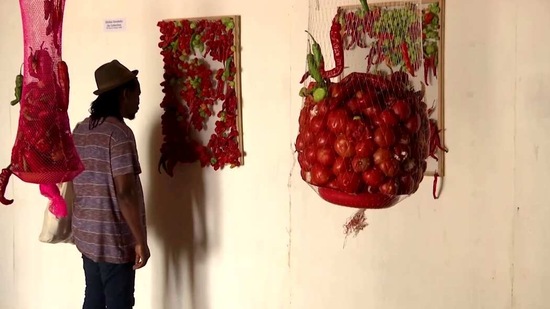Nigerian artist Olufela Omokeko carefully arranges fresh peppers on wooden planks hanging in an empty room. Instead of using spices for cooking, he wants them to encourage people to comply with measures that will stop the spread of the coronavirus.
His pieces, composed of red, yellow and green peppers, mounted on wooden boards and tomatoes hanging from nets, will rot during the life of the exhibition in Lagos. The decay reflects the food wasted during last year’s isolation, the 30-year-old artist said.
“I created this art space as a reflection of the scarcity … and the many challenges we experienced in the initial stage of the pandemic,” Omokeko said.
Lagos, the commercial center of Nigeria, and in the capital Abuja, imposed quarantines from the end of March to the beginning of May last year. The restrictions, along with a nationwide ban on interstate travel, disrupted supply chains that created hunger, while food spoiled in fields or warehouses.
“I don’t want us to go back to that stage again and my only advice is that the masses wear their masks to avoid another quarantine,” he said.
The artist fears that authorities will impose further restrictions as the country faces a second wave of COVID-19 infections with a sharp increase in cases in recent weeks.
Public health officials have repeatedly warned that Nigerians are not adhering to social distancing and mask-wearing guidelines. Many choose to wear them around the chin, rather than over the mouth and nose.
Omokeko hopes that the display of his rotten peppers, spilling liquid and emitting a pungent odor will provide a visceral warning of what could happen if safety guidelines are ignored.
“I am not wasting this material,” he said. “I am using it to raise awareness in the masses,” he added.

